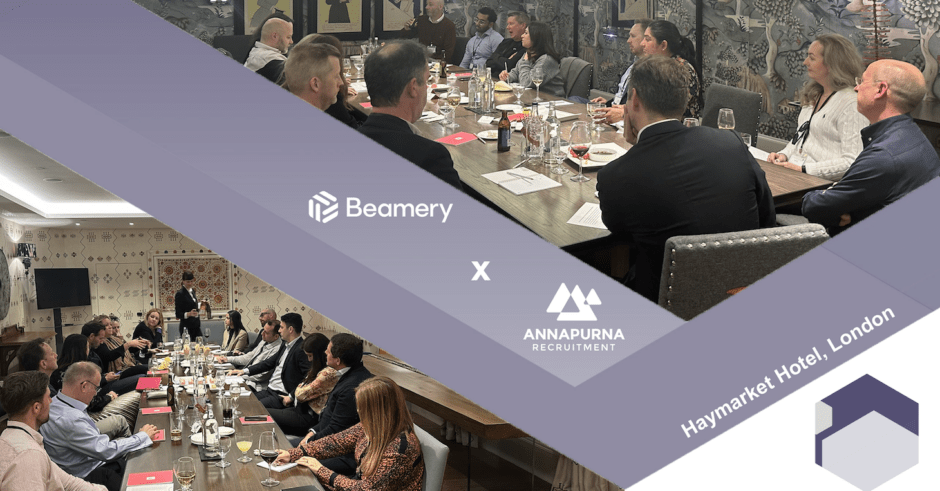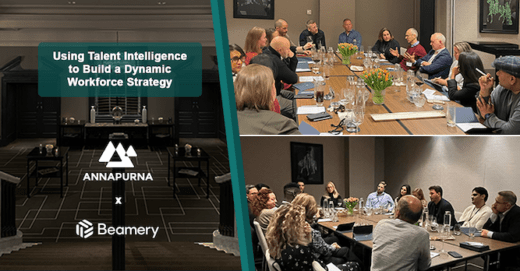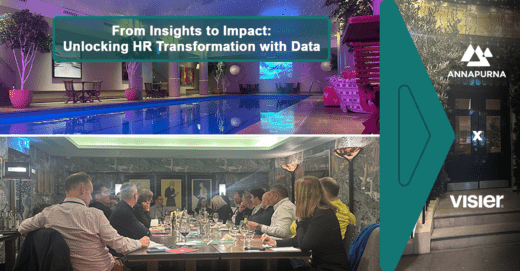We were delighted to partner with Beamery, the leading talent lifecycle management platform, for a fascinating discussion around ‘Human-Machine Collaboration: How AI is changing the dynamics of People Management’.
Due to the levels of interest in the topic, we hosted 2 roundtables of executive leaders in the space, bringing together over 25 people in 2 rooms. The rooms were hosted by James Ballard (Co-founder at Annapurna) and Joseph Nabarro (Director at Annapurna) with expertise being brought to the table from Nate West (Account Director at Beamery) and Ali Calder (Account Director at Beamery).
The conversation brought about the following takeaways:
AI Adoption requires a Cultural Shift
When it comes to any sort of digital transformation or digital implementation, employees need to understand and trust the technology. This is no different when it comes to embracing AI. The culture that sits at the heart of your organisation is crucial as successfully integrating AI will undoubtedly be one of the most impactful cultural changes within your organization.
Culture and people go hand in hand and your people need to understand how AI arrives at its conclusions. If our people can explain AI, then it will itself build trust and ensure ethical use. Transparency is key.
Data is Key when Unlocking Productivity and Skills Discovery with AI:
As organisations navigate the skills transformation, there has never been a more prevalent time to understand that garbage in, equals garbage out. Ensuring your data is accurate and well-organised is imperative for optimal AI results.
The group spoke about how they had tried to nurture the low-hanging fruit first to prove its worth. Automating repetitive tasks like scheduling and attendance tracking, for example, frees managers to focus on strategic initiatives and employee development. This starts to showcase the benefits of AI on a gradual scale.
There is no doubt that AI-powered skills discovery is here and is the future, however, we must build the foundations effectively. Through analysing data, AI has the ability to identify skill gaps and recommend training programs, leading to a more future-proof workforce. This is the future of work and where HR & AI can be working in collaboration for success.
AI as a Tool for Workforce Planning in an Uncertain Future
Traditional long-term workforce planning may not be suitable in today’s rapidly changing environment. Organisations need to have a fine balance of proactive and reactive decision-making, which is built on agility. Our teams should be able to embrace flexible planning when it comes to skills-based hiring to ensure we are aligning with trends.
Whilst AI can analyse data to identify trends, it cannot predict the future. AI insights should be utilised as a means to inform your decisions, but we should be ensuring that we maintain our human oversight for accountability. AI is a powerful tool, but it’s just a tool. Humans must leverage AI’s capabilities whilst maintaining control and critical thinking.
The potential of AI is huge when it comes to enhancing people management, but the journey to success relies on the importance of human-centric implementation and responsible use.
Technology is technology, as soon as you bring people into it, it’s a culture change. AI excels at logic and data analysis, but human judgment is vital for complex decision-making and creativity. Human judgement remains irreplaceable.
If you’re interested in learning more about how Beamery can help you understand the skills and capabilities within your organisation and help you attract, retain, upskills and deploy your workforce, please reach out to Beamery.



